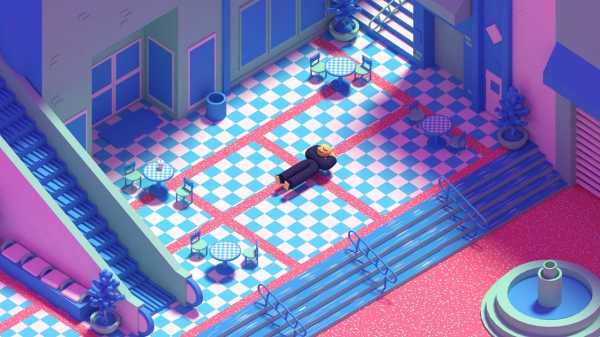
Late one night earlier this year, I followed a link, which someone had
shared on Twitter, to a YouTube video that featured the studio recording
of Toto’s “Africa,” edited to sound as though it were playing in an empty mall. In the video,
the song echoes over a tilted, pink-tinged photo of an empty
eighties-era shopping center—white tiles, green ferns, and mirrored
windows in a ghostly neon glow. Like most people, I have an irrationally
strong reaction to “Africa” to begin with:
the pure, vamping hope of the verses, the key change before the chorus,
which is a ridiculously earnest monument to pop catharsis built on the
same four-chord foundation as “Like a Rock,” “Let It Be,” and many other songs. In my 3 A.M. mood, the YouTube edit,
uploaded by a user named Cecil Robert, was almost too affecting to bear;
it sounded like longing and consolation together, extended into
emptiness, a shot of warmth coming out of a void.
Oddly, listening to Toto’s “Africa” in a mall seems to trigger some
fundamental human emotion; a remarkably high number of people have
tweeted, in the past several years, about the experience of being in a mall and listening to the song.
Last May, one Twitter user wrote, “fantasizing abt listening to africa by toto in an abandoned mall.” Cecil
Robert uploaded his video a few months later, and it has now been viewed
more than half a million times. I went to Robert’s YouTube profile and
found dozens of similar videos that he had made, starting, last June,
with a Mac DeMarco song edited to sound as though it were playing from another room. There were
other from-another-room edits (“Age of Consent,” “Linger”) and empty-mall edits (recent ones include “Under Pressure” and “God Only Knows”). I listened to
them all, and got progressively more emotional. Hearing a song you love
when it’s playing from elsewhere is a reassuring, isolating experience:
you feel solitary and cared for at the same time.
I signed up for Cecil Robert’s Patreon page so that I could
get him to edit a song of my choosing in one of his designated styles. (I
picked the from-another-room edit of Jai Paul’s “BTSTU.”) I found his
SoundCloud, where he had uploaded snippets of original
compositions—sweet, filtered, eighties-inflected riffs. I e-mailed him,
and we started corresponding. “I’ve lived in the tiny paper mill town of
Kaukauna, Wisconsin for all twenty years of my life,” he wrote. (Cecil
and Robert are his two middle names, he explained.) One night, during
his sophomore year of high school, he fell asleep on the futon in his
bedroom and woke up to “A Town with an Ocean View,” by Joe Hisaishi, a
song from the Miyazaki movie “Kiki’s Delivery Service,” playing on
YouTube. He was overwhelmed with a placeless nostalgia. He started
writing his own music.
Making a song sound as if it were coming from another room isn’t hard:
you lower the high frequencies, raise the low frequencies, and add some
reverb. (Programs such as Pro Tools, Ableton, and GarageBand make it
simple to play around with a track in this way.) To make a song sound as
if it were playing in an empty mall, you cut the low frequencies, raise
the mid-range frequencies, and add a delay, which imitates the way sound
bounces through a big, empty space.
Robert was careful to note that the from-another-room concept was
already a meme before he got around to it: Tumblr users had been making
similar edits since at least 2016. He pointed me to a YouTube video,
which was uploaded last May, that played Childish Gambino’s
“Redbone” to sound, as the user wrote, as though “you’re making out in the bathroom of a house party.” After that, a slew of in-a-bathroom-at-a-party edits popped up, mostly of heady, pulsing,
on-the-brink tracks (“Do I Wanna Know?,” by the Arctic
Monkeys; “Green Light,” by Lorde).
Robert and I both thought he was the first to do the empty-mall edits,
but a few days after our e-mail exchange he forwarded me a link to “Dead Mall Adventures,” an album released on Bandcamp, in early 2017, by a group of New Jersey
musicians called the Dead Air Collective. (Robert is better at going
down rabbit holes than I am.) The album is full of tinny, distant songs
that sound as though they’re time-travelling: one track filters Saint
Pepsi’s “Enjoy Yourself,”
which riffs on Michael Jackson, as if it were
playing in an empty mall. Since Robert’s “Africa” video became popular, similar edits have popped up on YouTube. Many of them are by a user named allyson m., who has
nearly fifty thousand subscribers to her page and has been making her
own empty-arena edits and driving-in-the-rain edits since last May.
Our lives increasingly play out in virtual spaces: instead of going to
malls, we surf on Amazon; many of us would happily forgo the mess of a
party to stay home and flirt through an app. Listening to music, too, is
now mostly frictionless, and this quality is why the little shadow world
of music that Robert, allyson m., and others inhabit is so appealing to
me. It’s nice to think of a handful of young people playing around on
Ableton on their laptops, in their bedrooms, trying to reintroduce a
sense of physical space into a listening environment of digital
isolation: conjuring the sort of scenario in which, say, you’re down the
hall from your older sibling who loves the Beach Boys, or in a place
where, for a change, someone else controls the music—in a crowd, or at a
mall, or in a pounding bathroom—someplace where you’ve taken the chance
of being lonely in public, instead of retreating and clicking around
alone.
Sourse: newyorker.com






